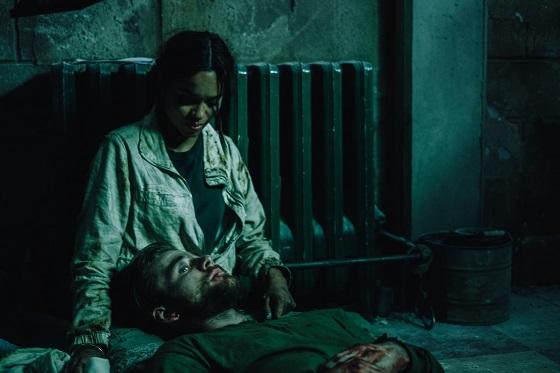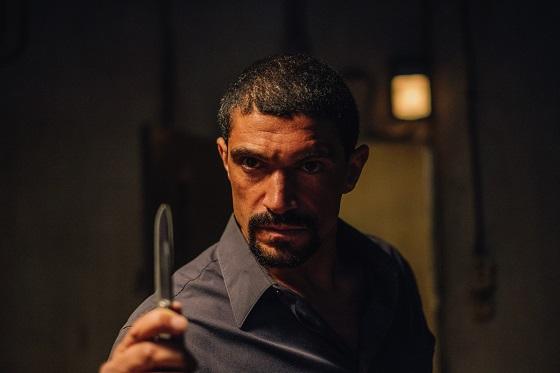
Wildcat is playing in theaters April 23, 2021 and On Digital and On Demand April 27, 2021

[Rating: Minor Rock Fist Down]
Torture is a hoot when it’s James Bond or Indiana Jones tied to a chair, mouthing off to a Nazi bastard with all the swagger of a barnyard roster. Yet when taken seriously and examined for the flawed, antiquated, barbaric madness that it really is, torture gets more complicated, and requires a hell of a lot more nuance and texture than what writer/director Jonathan W. Stokes can manage. His newest film, Wildcat, is little more than torture porn with all the foreplay and none of the payoff, and while it flirts with a few interesting concepts related to identity and control, it never connects any of its big ideas in a consistent or morally responsible way.
Set largely in one room, Wildcat opens with Kat Young (Georgia Campbell) yanking a bag off her head as she regains consciousness. She’s handcuffed to a bed that is itself bolted to the floor, and before she can get her bearings a man comes into her secure room with a pair of locking pliers to rip out her thumbnail. She tries to talk, to provide information, but the man doesn’t seem to care, and instead leaves the interrogation to a different guy, Khalid (Mido Hamada), who takes turns playing both good/bad cop depending on his mood.
The audience learns that Khalid’s insurgent forces attacked Kat’s convoy in northern Iraq and took her and a Marine named Luke (Luke Benward) captive, and while the bad guys know who/what the soldier is, they’ve got questions about Kat. As the interrogations progress, and Kat loses more fingernails, the audience, Luke, and Khalid learn increasingly more about Kat, what she’s doing in Mosul, and what her plans are for escape. Always on the lookout for a weapon, a name, or even the fragments of a bank account number, Kat consumes every piece of information that comes her way, biding her time and providing Khalid with just enough information to stay alive.

Through the first two acts of Wildcat, things wobble a bit, yet remain upright for the most part. Kat’s conscious yet clandestine resistance to Khalid’s questioning reinforces the idea that torture isn’t an especially useful method for obtaining good intelligence, and positions Kat as an active agent of change within her own story. Yet as events progress, things become more cartoonish by the second, and almost tilt over into parody as stereotypical presentations of torture fatigue and drama set in. Despite Kat and Luke supposedly giving up the requested information, Khalid and his goons keep torturing the pair, which makes no damn sense at all. What’s worse, none of the small acts of resistance and intelligence gathering that are seemingly meant to demonstrate how Kat is keeping control of the situation pay off, with Wildcat offering a rushed, borderline deus ex machina resolution instead.
So at the end of the day, this is a movie that is saying that torture does in fact work if you stick with it long enough and inflict the right amount of pain, and any small, quiet acts of resistance (around which the whole story revolves until the last 5 minutes) won’t end up making a difference. It’s just a mess, really: like a film that had its last act changed on the fly to make it more Hollywood. The best parts about Wildcat all exist in the moments between Campbell and Hamada, the latter smoldering and alive behind the eyes in every scene he appears. The script does an efficient job providing backstory for all its leads, but Hamada makes the most out of what’s given on the page and lights up the screen with an intoxicating mix of sympathy, hatred, and fear. The torture scenes, while they make no big-picture sense, are indeed effective, and pair well with costume and production design work that realistically transports the audience into a makeshift Iraqi torture cell.

Again, though, it just doesn’t come together as a story in a thematic or character-driven sense. There’s real, historical analogues in this film when it comes to Kat’s interrogation resistance techniques, yet again, none of it really amounts to anything, and just serves as a catalyst to get the tension and action calibrated for the next scene. So it begs the question: what is this movie about? Is it a referendum on torture? Wildcat goes back and forth on whether torture is an effective means of extracting useable intelligence, but seems to end up on the “pro” side of that debate, so that’s…awful. Or is it about the strength of one’s mind and the ability to maintain control under the most desperate circumstances? Well, without getting into spoiler territory, let’s just say it drops the ball there, as well.
It’s like a seesaw, this one. Wildcat is a movie without a moral or thematic compass, yet it does have a few interesting ideas, but then again, it has none of the story or character cohesion to bring them together. Sure there’s a crackling interplay between Campbell and Hamada, but it can’t save an otherwise listless torture yarn that seems to have as much knowledge on that topic as cinematic pacing. At 90 minutes, this one feels longer than it is, and despite some interesting flashes early on, it largely fizzles out via an ending that doesn’t seem to know how to escape the corner the script has painted it into. So, yeah: watching Wildcat isn’t torture on the level of having one’s fingernails ripped out, but it’s not far off from that, either.





Comments on this entry are closed.